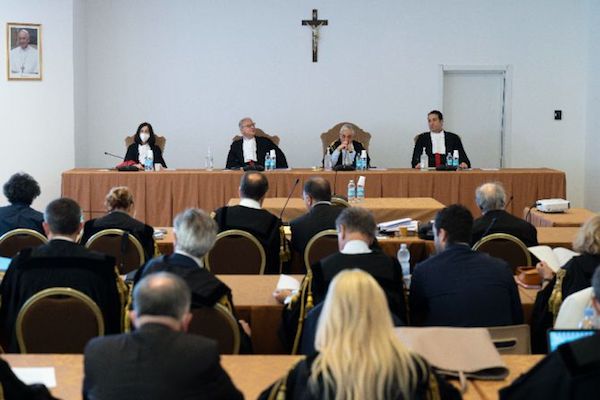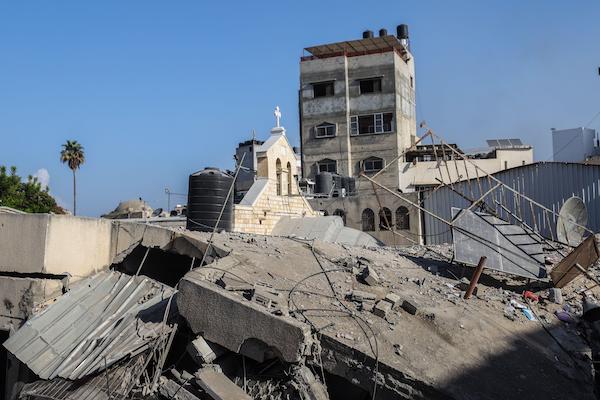Christian communities in the Holy Land said they faced extinction from Israeli attacks in response to the Hamas terrorist atrocities on 7 October.
In his Angelus address on Sunday, Pope Francis called for a ceasefire in Gaza and prayed that hostages would be released and aid allowed into the region.
The Catholic parish of the Holy Family in Gaza was reported to be baptising all the infants among the 700 refugees sheltering in its compound out of fear for their lives. The Hamas-run health ministry said that up to the weekend more than 8,000 people had been killed by Israeli retaliation.
On 27 October, when the Pope called for a day of prayer and fasting for peace, the Latin Patriarch of Jerusalem Cardinal Pierbattista Pizzaballa led a Via Crucis in the Old City of Jerusalem, attended by Archbishop Adolfo Tito Yllana, apostolic nuncio to Israel and Cyprus and apostolic delegate to Jerusalem and Palestine.
Fr Ibrahim Faltas OFM, the Egyptian-born Vicar of the Custody of the Holy Land, said that local Christians also took part. “I saw the sadness in the eyes of children, the deep concern in the eyes of adults,” he said, “and I prayed to see, as soon as possible the hope that sweeps away resignation from everyone's eyes.”
Patriarch Pizzaballa told the Italian broadcaster RAI last week that “the desire to leave will be very strong” among Gaza’s Christians, even after fighting ends.
“I believe we have to try to resist taking the easiest path, which is leaving to seek a calmer, more peaceful life somewhere else. We have to try to rebuild, but I know it’s easy to say that, living it is something else.”
He worried that “coexistence between Israelis and Palestinians will be practically impossible” in the future.
Cardinal Pietro Parolin, Vatican Secretary of State, has said a two-state solution “has always been the position of the Holy See.”
“Many no longer believe in it, partly because of all the developments that have taken place, but for us,” he continued, “it remains the only viable solution that could ensure a future of peace and serene closeness between the two states.”
Earlier in the week, the Pope’s peace envoy Cardinal Matteo Zuppi said that Hamas was “the worst enemy of the Palestinian people” and that a settlement demanded “clarity, firmness, and no kind of indulgence toward violence”.
On Monday, the Vatican’s secretary for relations with states Archbishop Paul Gallagher spoke by telephone to the Iranian foreign minister Hossein Amir-Abdollahian at the latter’s request, with the archbishop “reiterating the absolute necessity to avoid escalating the conflict and to achieve a two-state solution for a stable and lasting peace in the Middle East” according to a Vatican statement.
Anglicans in the occupied West Bank wrote to the Archbishop of Canterbury Justin Welby last week saying they felt “relegated” by his refusal to condemn Israeli actions.
“Our continued presence means the existence of the Anglican Communion in the birthplace of Christianity and therefore we would expect that our existence and struggle for justice and liberation…would be accurately portrayed and more publicly supported from your side,” said the letter from the congregations of Ramallah and Birzeit.
“What we would expect from our Church is to fully condemn the systematic denial of our rights and calls to annihilate our people…rather than attempting to create a balance between the oppressed and the oppressor.”
The congregations said that their identity has been under “constant attack ever since the onset of the Israeli State” and for the first time in its 2,000-year history there is “a serious threat to extinguish the Christian presence from Gaza”.
There are now just 47,000 Christians living in the Holy Land, less than one per cent of the population.
Fr Baschar Fawadleh, the Catholic parish priest of the majority Christian village of Taibeh in the West Bank, reported last week that he has joined a 70-strong night watch to protect inhabitants from attacks by Israeli settlers.
Several settlers had attacked his Palestinian parishioners when they were picking olives outside Taibeh and two of the parishioners were now in hospital with broken bones, he told KNA. Two Bedouin were also hurt and the school bus of a Christian school had been damaged.
The Greek-Orthodox and Latin-rite communities in Taibeh had decided to close their schools and send the children home – though a full evacuation of the village could lead to permanent eviction.
As two of the settlers had also been hurt, one of them seriously according to Israeli sources, the villagers now feared that the Israelis would retaliate and possibly attack the three churches in Taibeh.
Fr Fawadleh said he joined a group of 70 villagers who were going to stay up overnight from 10pm until 6am. “We must protect our houses and stop the settlers from entering Taibeh”, he said.
As Israeli Prime Minister Benjamin Netanyahu’s announced the “second phase of the war” this week, tensions have risen along Israel’s northern frontier with Lebanon, which has been manned by UN peacekeepers since 1978.
The Lebanese Shiite group Hezbollah, an ally of Hamas, has been exchanging fire with Israeli forces. Hezbollah’s Iran-backed military wing, which most recently fought with Israel in 2006, is believed to hold a much larger weapons cache than Hamas and up to 100,000 trained fighters.
More than 19,000 people have been internally displaced in southern Lebanon as a result of the fighting, according to the UN migration agency.
The mayor of the Christian border municipality of Rmeish, Milad al-Alam, said that 60 per cent of the largely Maronite population had fled.
An exchange of rocket fire near the border town of Qalaia prompted an assistant priest in the parish, Rabih Choueiri, to issue a statement condemning the violence.
“I denounce this act of sabotage that some of them are using by forcefully bringing some villages into the war and using unarmed civilians as a human shield to launch rockets,” he said. “As if the economic and social conditions we are going through today and the displacement of our families and children and their exodus to safe areas are not enough.”
He continued: “I appeal to those concerned about the security and military services to preserve the remaining security and stability in our town of Qalaia and not to drag the entire region into a war that we do not want because war is destruction, sadness, pain, and death…we are advocates of peace.”



 Loading ...
Loading ...